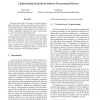Free Online Productivity Tools
i2Speak
i2Symbol
i2OCR
iTex2Img
iWeb2Print
iWeb2Shot
i2Type
iPdf2Split
iPdf2Merge
i2Bopomofo
i2Arabic
i2Style
i2Image
i2PDF
iLatex2Rtf
Sci2ools
CGO
2007
IEEE
2007
IEEE
Understanding Tradeoffs in Software Transactional Memory
There has been a flurry of recent work on the design of high performance software and hybrid hardware/software transactional memories (STMs and HyTMs). This paper reexamines the design decisions behind several of these stateof-the-art algorithms, adopting some ideas, rejecting others, all in an attempt to make STMs faster. We created the transactional locking (TL) framework of STM algorithms and used it to conduct a range of comparisons of the performance of non-blocking, lock-based, and Hybrid STM algorithms versus fine-grained hand-crafted ones. We were able to make several illuminating observations regarding lock acquisition order, the interaction of STMs with memory management schemes, and the role of overheads and abort rates in STM performance.
CGO 2007 | Hardware/software Transactional Memories | Hybrid STM | Software Engineering | STM Algorithms |
Related Content
| Added | 02 Jun 2010 |
| Updated | 02 Jun 2010 |
| Type | Conference |
| Year | 2007 |
| Where | CGO |
| Authors | David Dice, Nir Shavit |
Comments (0)

